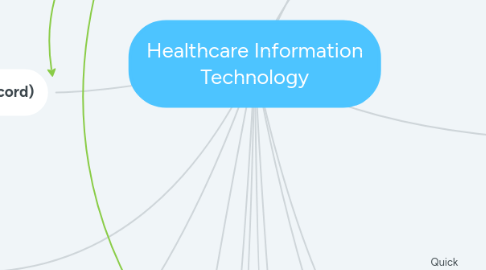Healthcare Information Technology
von Cassandra Peden

1. Convenient Communication
2. Practice Management
2.1. Manage Clinical and Administrative Aspects of Practice
2.2. Increased Efficiency
3. EMR (Electronic Medical Record)
3.1. Replace Paper Records
3.2. Medical Charting, Digital Charts and Patient Histories
3.3. Alert when preventative procedures and screenings due
3.4. For one Practice/Office
4. EHR (Electronic Health Record)
4.1. Similar to EMR,but more robust
4.2. Patient History, Diagnoses, Treatments, Medications, Allergies, X-rays, test results, etc.
4.3. Shares data with other EHRs
5. Scheduling
5.1. Patients can log in and schedule appointments
5.2. Convenient for patients
5.3. Reduces Medical Office Phone Trafffic
6. Secure Messaging
6.1. Allows two parties to transmit personal and medical information though a streamlined database
7. TeleHealth
7.1. Reduces Inequalities
7.2. Virtual MD/Specialist
7.3. Remote health monitoring
7.4. Flexible
8. ePrescribing
8.1. Quick
8.2. Ensures there is never a prescription mix due to handwriting
8.3. Can cross check for drug interactions
8.4. Increases prescribing of generic drugs = cost effective
9. Medical Billing
9.1. Automated billing and filling insurance claims
9.2. Notifications for Late Payments
10. Patient Portal
10.1. Views everything in EMR and EHR
10.2. Patients can send notes to care team
11. Personal Health Record
11.1. Owned by patient, not provider
11.2. Helps the patient keep track of information from visits with doctor
11.3. Helps patients track blood pressure, food intake, exercising, etc.
12. Medical Devices
12.1. Insulin Pumps
12.2. Pacemakers
12.3. ICDs
12.4. Implants
13. Mobile Health Apps
13.1. Health monitoring
13.2. Personal Health info


